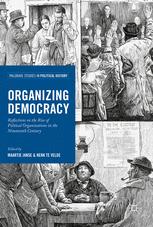

Most ebook files are in PDF format, so you can easily read them using various software such as Foxit Reader or directly on the Google Chrome browser.
Some ebook files are released by publishers in other formats such as .awz, .mobi, .epub, .fb2, etc. You may need to install specific software to read these formats on mobile/PC, such as Calibre.
Please read the tutorial at this link. https://ebooknice.com/page/post?id=faq
We offer FREE conversion to the popular formats you request; however, this may take some time. Therefore, right after payment, please email us, and we will try to provide the service as quickly as possible.
For some exceptional file formats or broken links (if any), please refrain from opening any disputes. Instead, email us first, and we will try to assist within a maximum of 6 hours.
EbookNice Team

Status:
Available5.0
25 reviewsThis book explores the new types of political organization that emerged in Western Europe and the United States during the nineteenth century, from popular meetings to single-issue organizations and political parties. The development of these has often been used to demonstrate a movement towards democratic representation or political institutionalization. This volume challenges the idea that the development of ‘democracy’ is a story of rise and progress at all. It is rather a story of continuous but never completely satisfying attempts of interpreting the rule of the people. Taking the perspective of nineteenth-century organizers as its point of departure, this study shows that contemporaries hardly distinguished between petitioning, meeting and association. The attraction of organizing was that it promised representation, accountability and popular participation. Only in the twentieth century did parties reliable partners for the state in averting revolution, managing the unpredictable effects of universal suffrage, and reforming society. This collection analyzes them in their earliest stage, as just one of several types of civil society organizations, that did not differ that much from each other. The promise of organization, and the experiments that resulted from it, deeply impacted modern politics.